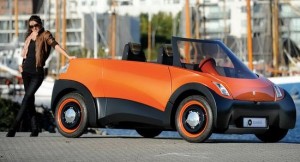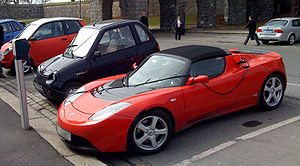Electric Car Breaks 500 Mile Barrier
The arguments against an electric car are growing fewer. A vehicle in development by ECOmove – a consortium of Danish car builders – has unveiled a car that can travel 500 miles without refueling. Once a sticking point for electric vehicles, distance could be ticked off the list of grievances the driving populace has with electrics. Fuel prices have moved drivers to turn to hybrid and clean diesel but advances in electric technology could signal the rise of electrics as a space for entrepreneurs and established companies alike.
ECOmove’s car, the QBEAK, can reach 75 miles and hour, uses electric motors and a fuel cell that converts a bio-methanol and water mixtur into electricity, which charges the battery.
Is the QBEAK a sexy car? That depends on what you think is sexy. It’s a small coup that seems to resemble a racing golf cart. Its low weight is one of the keys to its impressive range, the developers say. The city may be the natural environment for a car of this size (a city without large potholes) as its easy handling and parkability would be winning attributes. Life in a highway’s fast lane might be to much for the car’s top speed – though you’d be saving more fuel money than everyone that passes you – and the QBEAK would seem out of place in a car chase scene in any movie that was not a slapstick comedy. Still, 500 miles is pretty amazing. Factor in savings on fuel and you’d got a pretty convincing argument.
Still, QBEAK’s technology is just another indicator that the electric car space is going to grow and some of the players in that space will prosper.
The most prominent all-electric car company making waves right now is Tesla Motors (NASDAQ:TSLA). CEO Elon Musk’s commitment to putting out sleek performance vehicles has forced consumers to change the way they think about electric cars. The company plans to compete with the BMW 3 series with a new product due out in 2015. It’s Model S – available now – has been receiving good reviews and share prices are up. When reviewed by the team on Top Gear, the Tesla’s S-roadster allegedly broke down or ran out of power, though its now thought that the breakdown was scripted and Tesla filed a lawsuit against the show.
Larger players in the space include Nissan and Mitsubishi, which offer the LEAF and ‘i’ products respectively. Chevrolet has its Volt, Phoenix Vehicles has its SUT, Ford has its Focus EV, Mercedes has offered the BlueZero and BMW is reported to be working on a vehicle called MegaCity. Most of these cars cannot exceed 100 miles and could benefit from QBEAK-type technology to boost drivable distance, though Coda Automotive ‘s electric offering boasts 125-mile range and the Volt — a traditional hybrid — can go over 350.
How long will it take for companies already manufacturing electrics to take range seriously? My guess is they all are.
If range becomes a non-issue, chances are the electric car industry will turn to solving its charge-time issue. Oh wait, it already has: Tesla Motors predicts that technology will allow for one-hour charges in the future, insisting its new 440-volt fast charging system is a step in that direction. How good will these cars get and who will be the bigger players? Will in-house technology give certain players the edge? Will established car manufacturers always have the edge or is the space still open enough to allow for upstarts?
2012 Forbes.com LLC™ All Rights Reserved http://www.forbes.com

